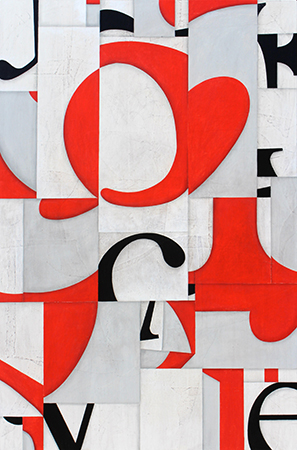Languaging and Emergent Scapes of the Intelligible: Thinking through an Experiment in Affective Mapping
DOI :
https://doi.org/10.25071/1925-5624.40335Mots-clés :
mise en mots, diffraction, affect, traduction, écolinguistiqueRésumé
Pourrait-on envisager des questions de traduction et de diversité linguistique dans une perspective écologique qui met de l’avant l’entrelace des concepts de mise en mots et des comportements d’insertion – l’utilisation de la langue témoignant tout autant de l’importance affective de l’appartenance que de sa fragilité dans des contextes cosmopolites urbains marqués par des phénomènes profonds de déplacement, de mobilité et de migration? Cet article, qui s'appuie sur de récentes recherches en écolinguistique, en théorie des affects et en études scientifiques et technologiques, explore la valeur potentielle d'une telle perspective, en présentant un projet artistique, Transitions in Progress. Making Space for Place (2015), conçu comme une expérience de cartographie affective d'une artère principale de la ville de Toronto.
Références
Armstrong, Frederick H. A City in the Making: Progress, People and Perils in Victorian Toronto. Dundurn Press, 1988.
Barad, Karen. Meeting the Universe Halfway: Quantum Physics and the Entanglement of Matter and Meaning. Duke University Press, 2007. DOI: https://doi.org/10.1215/9780822388128
Bennett, Jane. Vibrant Matter. Duke University Press, 2009. DOI: https://doi.org/10.1215/9780822391623
Buiani, Roberta. “Beyond the Map: An Experiment in Affective Geographies.” Noema, 5, June 2016, noemalab.eu/ideas/beyond-the-map-an-experiment-in-affectivegeographies/. Accessed 7 Dec. 2017.
Becker, A. L. Beyond Translation: Essays Towards a Modern Philology. University of Michigan Press, 1995. DOI: https://doi.org/10.3998/mpub.13805
Chow, Rey. Not Like a Native Speaker: On Languaging as a Postcolonial Experience. Columbia University Press, 2014. DOI: https://doi.org/10.7312/chow15144
Cronin, Michael and Sherry Simon. “Introduction: The city as translation zone.” Translation Studies, vol. 7, no.2, 2014, 119-132. DOI: https://doi.org/10.1080/14781700.2014.897641
Haraway, Donna J.. Modest_Witness@Second_Millenium. FemaleMan©_Meets_Oncomouse™: Feminism and Technoscience. Routledge, 1997.
Gynne, Annaliina, and Sanajeeta Bagga-Gupta. “Languaging in the Twenty-first Century: Exploring Modalities and Varieties in Literacies inside and outside Learning spaces,” in Language and Education, vol. 29, no. 6, 2015, p. 509-526. DOI: https://doi.org/10.1080/09500782.2015.1053812
Jensen, Thomas W. “Emotion in Languaging: Languaging as Affective, Adaptive and Flexible Behaviour in Social Interaction.” Frontiers in Psychology, vol. 5, July 2014, Article 720. DOI: https://doi.org/10.3389/fpsyg.2014.00720
Kaiser, Birgit Mara. “Worlding Comp Lit: Diffractive Reading with Barad, Glissant and Nancy.” Parallax, vol. 20, no. 3, 2014, pp. 274-287. DOI: https://doi.org/10.1080/13534645.2014.927634
Kier, Bailey. “Interdependent, Ecological Transsex: Notes on Re/Production, ‘Transgender Fish’ and the Management of Populations, Species and Resources.” Transgender Studies Reader 2, edited by Aren Aizura and Susan Stryker, Routledge, 2013, pp. 299-319. DOI: https://doi.org/10.1080/0740770X.2010.529254
Kravchenko, A.V. “Two Views on Language Ecology and Ecolinguistics.” Language Sciences, vol. 54, 2016, pp.102-113. DOI: https://doi.org/10.1016/j.langsci.2015.12.002
Mignolo, Walter. “Linguistic Maps, Literary Geographies and Cultural Landscapes: Language, Languaging and (Trans)nationalism.” Modern Languages Quarterly, vol. 57, no. 2, 1996, pp. 181-196. DOI: https://doi.org/10.1215/00267929-57-2-181
PARC. “Mission-Vision-Values.” Parkdale Activity-Recreation Centre, parc.on.ca/about/mission-vision-values/. Accessed 24 Nov. 2017.
“Performigrations: Transitions in Progress. Making Space for Place.” Vimeo. Posted by Roberta Buiani, 2015. vimeo.com/156919874. Accessed 7 Dec. 2017.
Phipps, Alison and Mike Gonzales. Modern Languages: Learning and Teaching in an Intercultural Field. Sage, 2004.
Sassen, Saskia. The Global City: New York, London, Tokyo. Princeton University Press, 2001. DOI: https://doi.org/10.1515/9781400847488
Steffensen, Sune Vork and Alwin Fill. “Ecolinguistics: The State of the Art and Future Horizons.” Language Sciences, vol. 41, 2014, pp. 6-25. DOI: https://doi.org/10.1016/j.langsci.2013.08.003
Swain, Merrill. “Talking it through. Languaging as a Source of Learning.” Sociocognitive Perspectives in Second Language Learning and Use, edited by Rob Batstone, Oxford University Press, 2006, pp.112-130
Thibault, Paul J. “The Reflexivity of Human Languaging and Nigel Love’s Two Orders of Language.” Language Sciences, vol. 61, 2017, pp. 74-85. DOI: https://doi.org/10.1016/j.langsci.2016.09.014
van Lier, Leo. “An Ecological-Semiotic Perspective on Language and Linguistics.” Language Acquisition and Language Socialization. Ecological Perspectives, edited by Claire Kramsch, Continuum, 2002, pp. 140-164.
Warner, Michael. Publics and Counterpublics. Zone Books, 1996.
Téléchargements
Comment citer
Numéro
Rubrique
Licence

This work is licensed under a Creative Commons Attribution-NonCommercial-NoDerivs 3.0 Unported License.

